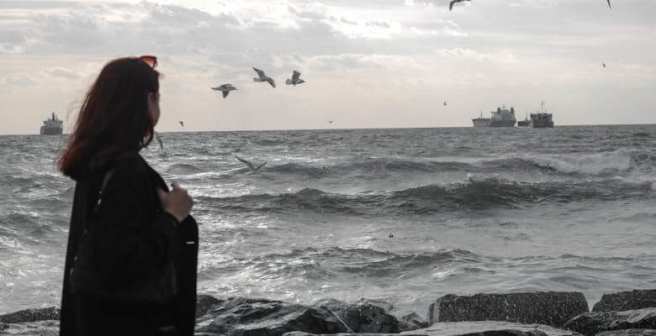Making a difference: Why I decided to do atmospheric chemistry

So, I had an entirely different plan for a blog post this week. But, after everything that has happened with the US elections, I really can’t offer much useful advice right now on stuff related to academia. So, sorry for that. I feel bad, especially after missing last week… If it’s any consolation, I will say that I have quite a few drafts right now on topics ranging from burn-out to lit reviews to how to take tests.
Anyway, one of the many things that this election means is the possibility of cuts on science funding—especially to the important agencies that support, fund, and research topics in climate science. If you’ve happened to venture onto my research tab or professional website, you’d find that my graduate research is in the field of atmospheric chemistry, which happens to indirectly deal with the current and future effects of climate change. So, among all the other ways that this election has/will affect me (as a minority woman born in a family of immigrants), it’s just the cherry on top to find out that our president-to-be is already working on “restructuring” climate policies (read: getting rid of them completely… *sigh* Can we… just have a moment of silence…).
But, this post is not about the election, because honestly, there are enough blogs talking about this. I’m election-ed out, honestly. Rather, this post is going to talk about how I stumbled into the field of atmospheric chemistry, why I decided to endure the fun that is grad school, and why I am going to continue working in this field despite the glum outlook of the funding situation.
Why am I doing this? Because, honestly, I need a little motivation right now—a nice reminder of why I want to be a scientist and why I get up every morning to go to work, even on the most unglamorous scientific days. But it’s not only that. I also want to let everyone reading this know just how much I care about my research, care about the state of the world, and care about the potential my science has in helping solve a too real, world-wide problem.
I’m going to start off this little narrative by first saying that being a chemist—especially an atmospheric chemist—was never a part of my “grand plan” or whatever they force stressed-out high schoolers to come up with prior to application deadlines. In fact, I didn’t even know what a chemist was prior to entering college. To me, it was just an abstract word–a title that only got a brief mention on TV shows. The sheer fact I ended up majoring in chemistry in the first place was the work of a series of happy happenstances and one enthusiastic professor. However, even when I decided to change my major to chemistry (I was originally pre-med), I still had no idea what to do with that degree. Chemistry is a surprisingly broad field and I apparently have commitment issues when it comes to choosing my future.
So, I dabbled. I dabbled in many things. I did a short stint in a research lab as a synthetic organic chemist and I paid obnoxiously close attention in my chemistry classes in hopes that I would suddenly have an “Ah-ha!” moment and instantly know what I want to do in life.
I didn’t, by the way. That’s apparently not how this works.
Well, one day, I decided to take some summer courses to get a few major requirements out of the way. But, I apparently needed one more class to qualify for financial aid. So, as I was scrolling through the UCR catalog for courses that weren’t too time consuming and fit my schedule, I stumbled upon an introductory environmental science course and signed up on a whim.
Holy crap! Best decision ever.
Now, I’ve always been one of those “save the planet” kind of girls. I like to blame it on all the science museums my mom took me to as a kid since they all have that underlying “be sustainable” tone to them. But, this course introduced me to a whole other side of being environmentally friendly. It was more than just recycling, driving less, and saving the whales. There were scientists from a wide range of fields that dealt with issues such as waste management, soil science, water pollution, air pollution, toxicology, clean energy, solar cells… what?! Why did no one tell me this existed?! Even better, chemistry seemed to play a huge role in this field. After all, when it comes down to it, everything’s a chemical reaction.
Because I was so enamored with this field, I decided to tack on an environmental science minor once classes started back up the following fall. Also, because I apparently couldn’t hide my enthusiasm for this newly found field, I happened to do well enough in the class that the professor took notice and offered me a research gig in his lab, which I took and I began doing some awesome work in fields like hydrology and soil science. And slowly, but surely I decided:
“This is it! I’m going to be an environmental chemist!”
Of course, environmental chemistry covers way too many topics for that to be the end of the story. But I didn’t really care anymore, because I figured I’d be happy in whatever environmental lab or consulting firm I ended up in. Which, at the time, was probably true. However, it was sometime into my third year that I had to take an atmospheric chemistry course, which happened to be a shared requirement between my major and minor (because could life be any more perfect?).
“Nope. I take everything back. This is what I want to do!”
Atmospheric chemistry was everything I loved and more. I got to use a mixture of different chemistry subfields (physical, analytical, organic) to solve relevant problems–problems that I could physically see (and breathe, e.g. LA smog) or that were hot topics in the news and had big implications in the world as we know it (e.g. climate change). It just baffled my mind that our whole climate system is affected by the concentration of tiny molecules that make up our greenhouse gases. I was intrigued at the fact that the haze I was so used to seeing was formed by simply emitting some car exhaust, baking it in the sunlight, and reacting it with other molecules already in the air. And I was amazed at just how global of a problem this was because, as it turns out, our pollution doesn’t care about state or country lines. And, even better, I was ecstatic that I could be amongst those who researched these topics/issues – someone who could make an actual difference in the world all while doing what I loved (science) in order to work towards making the planet a healthier and more sustainable place for my children and their children, etc.
Because this topic was just so cool, I decided to apply for a bunch of internships to double-check that this was actually what I wanted to do, and get some actual research experience in the field (which I advise all students to do). And, because I’m incapable of being subtle, my professor at the time noticed my interest and referred me to this very cool NASA internship that I managed to get accepted to. This led me to spending a whole summer amongst other atmospheric chemists and learning more about the different questions that atmospheric chemistry can answer. And it was tough; I had to learn a new field on the fly and also have the bonus stress of coming up with a research project in 8 weeks. But, the fact that I stuck through it and somehow got even more excited as I kept learning new things eventually made me realize that this was what I was passionate about and this is what I wanted to do.
“Not with a bang, but with a whimper,” as they say (let’s just ignore the rest of the poem in this case, though).
So now, I’m at Caltech, doing research in atmospheric chemistry. My research focuses on a very specific molecule in the air: isoprene, a very reactive compound emitted by trees. Depending on if it reacts with NOx (a group of chemicals typically emitted from cars and factories) or other compounds found in “cleaner” environments like a tropical forest, it can affect the production of aerosols (which can affect climate) and tropospheric ozone (or “bad” ozone, which is bad to breathe and can also double as a greenhouse gas). In a bigger picture, knowing how this single molecule alone reacts in the air can fill a lot of knowledge gaps, better convey how important forests are to our planet, and improve models that can predict how our air quality and climate will change in the future. These are the same models, mind you, that policy makers can use to create new (and informed!) regulations to clean up our air and protect our environment. And that’s just one molecule! Imagine how much awesome science is being created by all the other atmospheric scientists out there studying a multitude of compounds! (Like, let’s say, ammonia)
But now, there’s a threat of a major defunding of science–especially that which relates to the “hoax” that is climate change. Just think of all the valuable information that could be lost when the 45th president and his Republican-majority House and Senate officially gain power. And yes, America isn’t the only country with atmospheric scientists. And no, the world doesn’t just revolve around what happens in the US (even though we might like to think that). But, when you consider that the United States is one of the top emitters of greenhouse gases and other kinds of air pollution…well, let’s just say it’s a big deal to the world if our climate policy suddenly vanishes and a bunch of atmospheric and climate scientists are too busy scrambling for funding to do any actual science.
As I said before, I’m a little unmotivated and very scared of what’s to come in 2017. Even worse, I have absolutely no idea how to help stop all this from happening. It seems like an uphill battle and it’s hard not to feel small and helpless when so many bad things seem to keep happening in the world. But, what I do know is that I love my field. I’ve grown so much from just one year of research adventures. And even in the toughest of times–when I’m up to my neck in deadlines and feeling like a complete imposter–I love how, at the end of the day, I am ultimately helping solve one of the most important problems in the world, whether the government likes it or not.
And that, my friends, is why I am still getting out of bed each morning. That is why I’m an atmospheric chemist.
Krystal Vasquez (@caffeinatedkrys) is a PhD candidate at the California Institute of Technology in the Division of Chemistry and Chemical Engineering. This story was published on November 13, 2016, on Krystal’s blog, Caffeinated Confidence (available here), and has been republished here with her permission.




